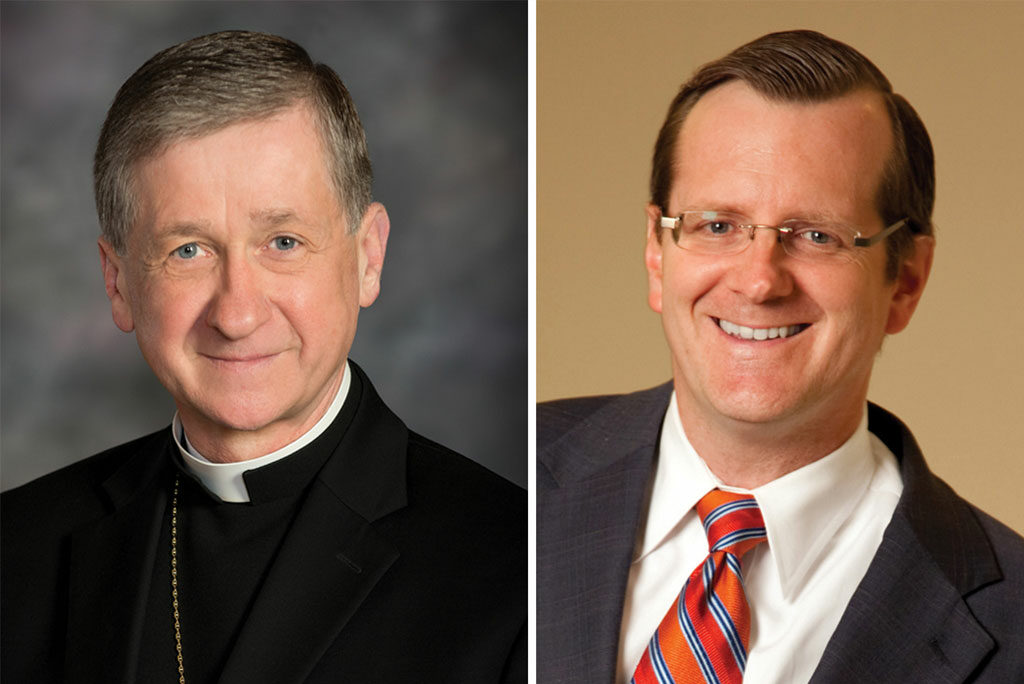
By Jeni Miller
An unprecedented “Interdenominational Conversation” to commemorate the 500th anniversary of the Reformation is planned for 7:30 p.m. Oct. 30 at the Chapel of Our Lord on the campus of Concordia University Chicago (CUC) in River Forest, Ill.
The event will bring together Lutheran, Reformed and Roman Catholic leaders to discuss “the historic and theological divisions emerging from the Reformation controversies as well as points of shared concern and common cause among Christian churches,” according to its coordinator, the Rev. Dr. Jeffrey Leininger, university pastor and dean of the chapel at CUC.
Participating in the panel discussion will be LCMS President Rev. Dr. Matthew C. Harrison; the Rev. Dr. Philip Ryken, president of Wheaton College, Wheaton, Ill.; and Cardinal Blase J. Cupich of the Archdiocese of Chicago. Manya Brachear Pashman, a seasoned and well-regarded religion correspondent for the Chicago Tribune, will serve as moderator.
More than 500 people are expected to attend the free event, and attendees will have opportunities to ask questions of the panelists during and after the program.
Leininger said the three panelists represent “the three main strands of Christianity emerging from the Reformation controversies: Roman Catholic, Lutheran and Reformed.
“Those three strands coming together, being honest about our differences but open to further discussion about where we’re at after 500 years, in a public forum, not a church service, not worshiping together, having a principled, public conversation about denominational divergence and convergence at this historic mile marker,” he said, is something people will be interested in.
Those who attend “will want to ask questions — people are eager to hear what these important leaders have to say.”
And the panelists, he added, “are ready for the tough questions. They aren’t going to sugarcoat, but [will] discuss these issues with honesty and charity.”
Among those “tough questions,” Leininger noted, is one regarding why the Reformation was, as Christian historian Jaroslav Pelikan put it, a “tragic necessity.” Each panelist will be asked: How tragic, and how necessary, was the Reformation?
“The Reformation at 500: An Interdenominational Conversation” is considered a historic event in a historic anniversary year by LCMS leaders and its CUC planners. And, with a goal to foster “honesty and charity,” the conversation is perhaps a necessary one.
“As the most active European participant in the Faith and Order movement before World War II often said, ‘There is more true unity of the faith where Christians of differing confessions are honest about their differences than when they sweep them under the rug,’ ” said Harrison. “The Reformation did and continues to raise serious questions for all serious Christians. It’s good to talk about them.”
Ryken noted that, even after 500 years, “the Protestant Reformation remains relevant — not only for the Church, but also for many cultures around the world.”
“Hopefully we can have a Catholic/Lutheran/Evangelical conversation about theology and practice with as much rigor, but much less rancor, than our fathers (and mothers) in the faith.”
This event and others taking place in October on the CUC campus are meant to involve not just Lutherans, but also other denominations and the broader public.
“The university’s goal is to recognize and celebrate the Reformation’s 500th anniversary with as wide of an audience as possible,” explained Eric Matanyi, assistant vice-president for communications and marketing at CUC. “The Reformation as an historical event has had a profound effect on society — not only from a religious standpoint, but from a cultural and political standpoint. So we want to look at it not just from a Lutheran perspective, but culturally, across the board and around the world.
“The impact of the Reformation is much larger than just on Christianity or religion itself,” Matanyi noted. “That’s why the 500th anniversary is an excellent point in time to reflect on what has happened in the past and how we move forward, as Christians, together, in the future.”
For Leininger — and the LCMS — it’s still all about the Gospel.
“The difficulty for LCMS Lutherans, for sure, is not just that we’re talking about significant historical events or how Luther changed western culture, but we’re celebrating the recovery of the Christian Gospel for the Church and world,” he said.
To Leininger, the invitations to take part in the “Interdenomination Conversation” could be considered somewhat “controversial.”
“Here we are, 500 years after the Reformation,” he said, “and we’re inviting the Cardinal of Chicago and the president of Wheaton College, on the eve of the commemoration, saying, ‘Let’s talk.’ But, like us, the panelists are enthusiastic about the discussion.”
It will be a historic discussion, Leininger believes, that attendees “will remember” and “tell their grandkids that they were there.”
Those who plan to attend are asked to RSVP via CUC’s event webpage beginning Aug. 15. “The Reformation at 500: An Interdenominational Conversation” also will be livestreamed via the website.
For more information on this and other Reformation commemoration events at Concordia University Chicago this fall, visit cuchicago.edu/reformation.
Deaconess Jeni Miller (jenikaiser@aol.com) is a freelance writer and member of Lutheran Church of the Ascension in Atlanta.
Posted July 12, 2017
